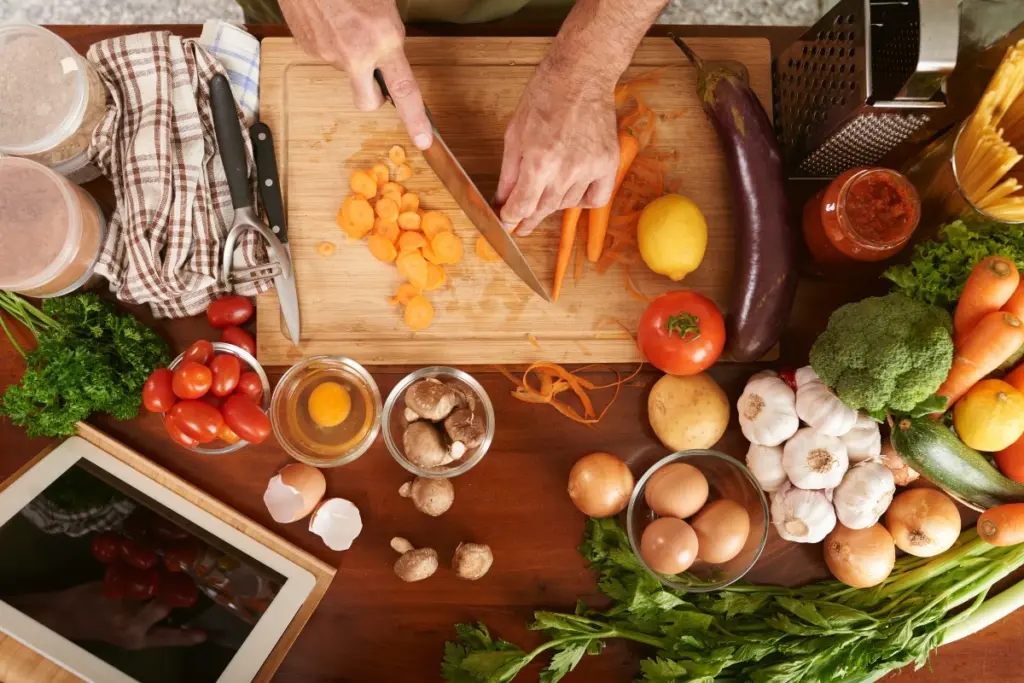When substance abuse takes over, regular meals (to say nothing of nutrition) often go out the window. People skip breakfast, grab empty calories, or forget eating altogether – and that’s the best case scenario.
The body’s need for fuel gets overshadowed by the need for the next dose. Few realize that ignoring healthy food drains energy, weakens organs, and muddles the brain, all of which slow the progress toward long-lasting recovery.
Good food does more than fill the plate. Studies show that balanced nutrition helps the brain heal, mood hover in the good zone, and cravings drop.
When nutrients flow in, the body and brain actually start rebalancing the systems that drugs once hijacked. Vitamins, minerals, and healthy proteins really can help brain chemistry.
You can do wonders for your health, as well as your peace of mind and sobriety, by choosing meals that power the recovery journey.
How Addiction Affects Nutritional Health and Deficiencies
Addiction can seriously mess with your body’s nutrition in a bunch of ways.
Drugs and alcohol tend to make people eat less, depriving them of crucial vitamins from getting absorbed, and chip away at minerals that the body really can’t live without.
When you’re dealing with addiction, you’re likely low on:
- B vitamins like B1, B6, B12, and folate
- Vitamin D and vitamin C
- Key minerals, including magnesium, zinc, and iron
- Omega-3 fatty acids
- Sufficient protein and complex carbs
Getting nutrition back on track means a lot more than just popping some pills. The brain also needs particular nutrients so it can make neurotransmitters—those chemical buddies that keep mood, sleep, appetite, and the reward system running.
The first few months of recovery are when the brain starts to balance itself, and good food can really help the process.
Anti-Inflammatory Foods and Physical Healing in Recovery
Recovery from substance use takes time, and the body is often in repair mode when someone begins this journey. One way to speed things up is through good nutrition that includes:
- Antioxidants: Combat oxidative stress. Found in citrus, strawberries, spinach, almonds, sunflower seeds, carrots, sweet potatoes, blueberries, green tea, and dark chocolate.
- Omega-3 fatty acids: Reduce long-term inflammation. Found in salmon, walnuts, and flaxseed.
- Protein: Essential for tissue repair, immunity, muscle strength, and enzyme production. Found in poultry, eggs, dairy, legumes, and nuts.
Brain Chemistry, Neurotransmitters, and Better Recovery Meals
When someone is recovering from addiction, their brain’s reward system is still trying to heal. Key workers in this system are three neurotransmitters: dopamine, serotonin, and GABA. Each of these chemicals needs special nutrients to do its job:

- Dopamine: Made from the amino acid tyrosine, found in lean meats, fish, eggs, and beans. Needs B6, folate, and iron to complete the process.
- Serotonin: Made from tryptophan, found in turkey, fish, eggs, and seeds. Balanced protein intake helps it cross into the brain.
- GABA: Made from glutamate with the help of vitamin B6 and magnesium. Supports calmness, sleep, and reduced anxiety.
When a person was actively using drugs, the brain’s reward system was triggered by outside substances. After quitting, the brain needs to reprogram itself to produce dopamine, serotonin, and GABA.
A steady and varied diet offers the raw building blocks for this reprogramming, which may help keep mood swings under control.
Managing Blood Sugar and Reducing Substance Cravings
Big swings in blood sugar can kick off cravings and make your mood feel shaky. This can be even harder in the early stages of recovery.
Since lots of drugs mess with how your body controls sugar, the brain can mistake a dip in blood sugar for a need for your old substance.
To keep your blood sugar steady, focus on complex carbohydrates. They let glucose enter the blood slowly, giving you a longer-lasting energy and mood lift. Try to eat:
- Whole grains such as oats, quinoa, and brown rice
- Beans and legumes
- Starchy vegetables, with sweet potatoes being a great pick
- Fiber-rich fruits
Watch out for simple sugars and refined carbs, though. They rush sugar into the blood, followed by a swift dip that can send cravings through the roof and swing your mood.
Adding protein and healthy fats to meals also helps to slow the absorption of sugars, keeping blood sugar levels stable.
For best results, mix carbs with either protein or healthy fat for snacks and meals, and you’ll avoid the energy rollercoaster that can hinder your recovery.
Nutritional Therapy in Professional Addiction Treatment
Today’s effective addiction programs understand that good food can make a real difference. Yes, most facilities will tailor your treatment plan to your needs. But, typically, most treatment plans will include some version of:
- Nutrient assessments and supplementation when needed (B vitamins, vitamin D, magnesium, omega-3s).
- Education and meal planning to build balanced eating skills that last.
- Dietary support for those with eating disorders like anorexia or bulimia, medical issues, or medication side effects.
- Pro-run kitchens in treatment centers offering balanced meals and practical modeling of healthy eating.
Creating a Recovery-Supporting Nutrition Plan
Essential Vitamins and Minerals for Addiction Recovery
- Protein with purpose: 20–30 grams per meal from chicken, beans, eggs, or quinoa.
- Smart carbs: Whole grains, fruits, and vegetables. Avoid refined carbs.
- Friendly fats: Omega-3s, olive oil, avocados, nuts, seeds. Limit trans fats.
- Hydration: Prioritize water, limit caffeine early in recovery.
Meal Planning and Healthy Eating Habits for Recovery
- Eat on schedule: Every 3–4 hours to prevent mood/energy dips.
- Prep in advance: Roast veggies, grill chicken, or cook chili in batches.
- Shop smart: Stick to a grocery list focused on whole foods.
Your treatment plan may include some variations on this.

Focus on Whole Foods Instead of Packaged Foods
A healthy, balanced diet provides the energy and nutrients your brain needs to improve your mood and increase daily energy levels.
Therefore, avoid highly packaged snacks, convenience food, processed food, or junk food.
Batch Cooking When Energy and Motivation Allow
Prepare extra servings of simple meals for vigorous and high-energy days. Freeze or refrigerate for easy recovery-friendly access later.
Fix Sugar Cravings in the Brain
- Replace candy with fruits like bananas, berries, or apples.
- Pair fruits with protein or fat (nuts, yogurt, nut butter).
- Eat balanced meals every 3 hours to stabilize mood and reduce sugar cravings.
Nutrition Questions and Recovery
Q: Should everyone in recovery use vitamins or extra supplements?
A: Not always—depends on diet, health conditions, and lab tests. Work with a healthcare provider.
Q: Once I improve nutrition, how soon will I see a difference?
A: Energy may rise within days, but brain chemistry rebalances over months. Consistency matters.
Q: Can some foods make me crave drugs or alcohol again?
A: Not directly, but sugar spikes/drops can mimic cravings. Keep meals balanced.
Q: Can I safely try restrictive diets right after sobriety?
A: Recovery is your priority, so focus on eating healthy, resting, and stability. “First things first.”
Q: What if I struggle with both eating disorders and addiction?
A: Seek specialized programs that deal with eating disorders.
Nutrition Can Nourish Recovery
Eating the right foods matters in recovery because it helps the brain heal, keeps moods and energy steady, and strengthens the body. Good nutrition will help you feel better, have more energy, and ultimately, be happier.
Think of nutrition as one vital piece of the recovery puzzle, not the whole picture.
When you wake up in recovery, aim for steady, balanced meals instead of hunting for the perfect diet. Early recovery is about creating routines and structure in your life to avoid idle time, which can trigger relapse.
When nutrition teams up with the care of other support services, you build a stronger base for a future you can depend on.
Talk to doctors, counselors, or dietitians who specialize in addiction. They can help you create a simple, realistic eating plan that fits your individual journey and life.
Remember that recovery is a long road, and in every step, food can steady and strengthen both your body and mind.
Star City Recovery offers a luxury rehab in Los Angeles where healing includes both professional care and proper nutrition. Eating well strengthens the body, restores the brain, and keeps you energized for each step of recovery.
Contact us and take the first step toward long-term sobriety!







